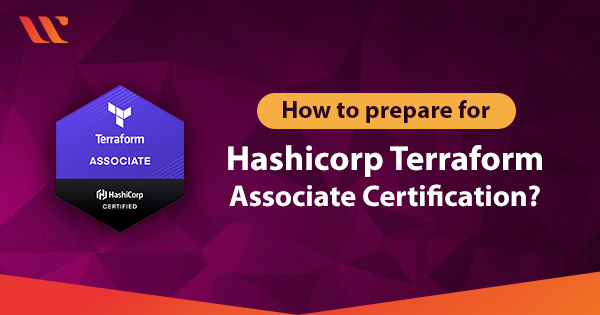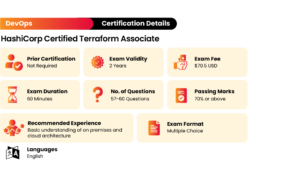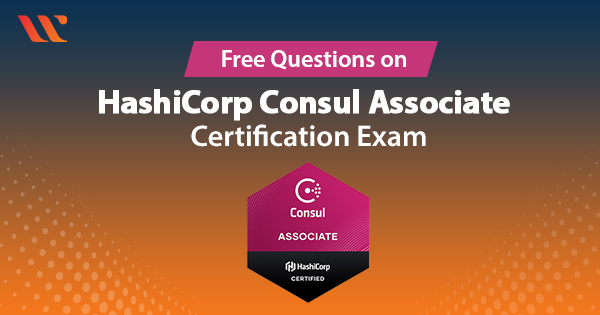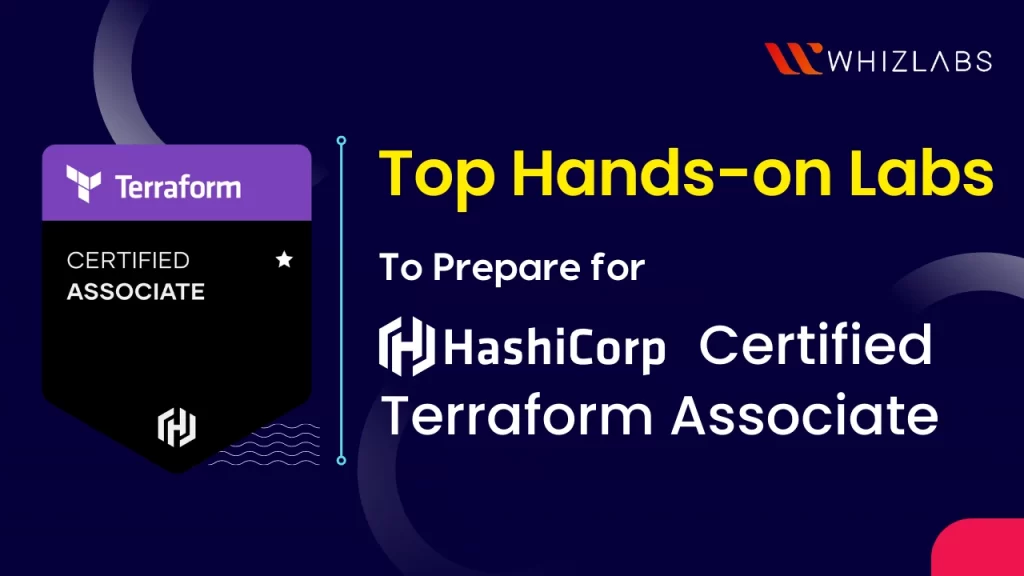This blog post will shed light on the domains involved in the certification exam and provide detailed insights on how you can proceed once you start preparing for the HashiCorp Terraform Associate Certification. Before you dive headlong into assessing and shaping perspectives on the certification, let us first dig deeper into what Hashicorp is and how you would define Terraform.
So, What exactly is HashiCorp Terraform Associate Certification? It is basically a process that will further help you gain a practical understanding of Terraform tools and the associated SaaS offerings termed Terraform Cloud. HashiCorp is a company that specializes in building open-source components for multi-cloud workloads.
In fact, Terraform can help you manage ecosystems with a configuration language called HashiCorp Configuration Language, popularly referred to as HCL, to ensure readable and automated implementations.
Latest Update:
Terraform Associate 003 (Coming Soon)
What will you learn from the HashiCorp Terraform Associate Certification Exam?
This course will teach you everything you need to become proficient in DevOps and cloud engineering. The course increasingly focuses on upgrading your skills in Infrastructure as Code (IaC) in Terraform. There are 9 domains in the HashiCorp Terraform Associate exam. Here’s a detailed view of the syllabus:
1. Comprehending Infrastructure as Code (IaC): You will learn:
- Explaining IaC
- Describing benefits of IaC
IaC solves real-world problems associated with ecosystem drifts in release pipelines. Not knowing what IaC means as a DevOps engineer means you would have to manually administer and maintain infrastructure and keep a check on errors.
2. Assessing Terraform’s purpose: This domain imparts:
- Understanding multi-cloud and provider agnostic benefits
- Understanding the benefits of state
Life becomes much easier once you understand and get the tricks of Terraform up your sleeves. You will learn how to manage and track your infrastructure, implement changes, and standardize configurations.
3. Fundamentals of Terraform: This domain sheds light on:
- Manage Terraform, provider deployment, and versioning
- Defining plugin-based architecture
- Describing multiple provider usage
- Defining how Terraform finds and extracts providers
- Understanding when to use provisioners and local exe and remote exe
You will learn how to match real-world resources with those of your configurations, record metadata, and improve the workings of large infrastructures.
4. Handling Terraform CLI (outside workflow): This domain captures scenarios/use cases, like:
- When to use ‘terraform fmt’ to format code
- When to use ‘terraform taint’ to taint resources of Terraform
- When to use ‘terraform import’ to import existing infrastructure to Terraform state
- When to use ‘terraform workspace’ to create a workspace
- When to use ‘terraform state’ to use state
- When to use verbal logging and what is the outcome
You will get familiar with using Terraform workflows in all scenarios: whether you work as an individual professional or as a team.
5. Managing Terraform Workflows: This domain involves
- Define Terraform workflow
- Launch Terraform working directory
- Authenticate Terraform configuration
- Produce execution plan for Terraform
- Demolish Terraform managed environment
This exam will teach you how to write, plan and then apply Terraform workflows whether you work individually or as a team.
6. Managing Terraform Modules: This domain includes:
- Contrast module source options
- Interaction with inputs and outputs of the module
- Define variable scope within modules
- Finding out modules from the public Terraform Module Registry
- Describe module version
Managing Terraform is also a double-faced coin that might add to the complexities at times while creating configurations. You will get to learn ways to encapsulate, reuse, and organize your configurations.
7. Deploy and handle state: In this domain, you will learn:
- Define default local backend
- Outline state locking
- Manage backend authentication ways
- Define mechanism of remote state storage and supported standard backends
- Knowledge of secret management in state files
Terraform cloud and enterprise work differently. You would need to dive deeper to learn which one will allow better collaboration among your team of coders.
8. Read, produce, and alter configurations: This domain delves into:
- Describe the use of variables and outputs
- Define best practices of secure secret injection
- Usage of collection and structural types
- Build and distinguish resource and data configuration
- How to use resource addressing and resource parameters to connect resources together
- How to use Terraform built-in functions to write configurations
- How to use dynamic look to configure resource
- Define built-in dependency management (order of execution based)
You will know how to describe, handle and create resources and data configurations.
9. Familiarity with Terraform cloud and Enterprise capabilities: This domain covers:
- Defining the advantages of Sentinel, registry, and workspaces
- Distinguish OSS and TFE workspaces
- Gisting characteristics of Terraform Cloud
You will learn to define cloud and on-premise resources and make them available in a more human-friendly, readable, and automated configuration.
Apart from this, you will also learn in detail about:
- Launching Terraform and HCL basics
- Building, updating, and ending infrastructures
- Terraform providers
- Version Constraints
- How to target resources
- Data sources
- Terraform state
- Remote state
Roles & Responsibilities of Terraform associate
- Terraform associate is responsible for designing, and building up new infrastructure and tools
- Discovers new ways to automate the cloud process
- He is responsible to protect systems from cybersecurity threats
- He also associates with the developer to make sure that he is initiating the established process
- He identifies and solves any technical problems
Format of HashiCorp Terraform Associate Exam
The duration of the HashiCorp Terraform Associate Certification exam is 60 minutes or 1 hour, and it is a computerized test. The exam would contain 57 multiple-choice questions. Passing marks for the exam is 70%. The validity of the exam is for two years and would cost USD 70.50. No prior certification is required, but you would need to have:
- Basic terminal skills on implementation on any major cloud platforms.
- Fundamental knowledge of on-premise and cloud architecture.
How to prepare for HashiCorp Terraform Associate Certification?
First things first: Always start with the basics for any exam. One of the main requirements for gaining success in this certification is to have an in-depth knowledge of cloud providers. That doesn’t mean you have to become a cloud expert. But basic knowledge of the cloud and DevOps should be enough to head-start your journey.
Here are some quick steps you can follow while preparing for the exam:
1. Start with the official introduction videos available on the HashiCorp official website. After that, try to get some practical experience with any cloud provider.
2. There are also a lot of tutorials that give you detailed knowledge of how to deal with Terraform configurations. You can refer to this as a resource for extra practice.
3. Once you finish with configuration models, it is time for you to move on to add variables and output, build multiple modules, and use module output as a variable for another module. Go for the DRY method—Don’t Repeat Yourself principle while building and reusing modules for full implementation. These official tutorials cover all the concepts.
4. You would also need to have depth in managing and maintaining the state.
5. Next, prioritize taking practice tests and getting familiar with HashiCorp Terraform Exam questions for all the topics covered in the domains.
6. Last but not least, do not undermine the significance of practical exposure to these subjects. In fact, try to be a subject matter expert by creating everything from scratch using the initials. With time, not only will you get clarity of the fundamentals but also gain skills to troubleshoot.
7. Finally, the secret sauce is to appear for the ultimate mock exam of HashiCorp Terraform which contains links for every exam topic along with some practice questions for better understanding. Don’t forget to sign up and create an account.
So this was all about how to proceed with preparation. Next on your list should be how to navigate through materials and resources while preparing. Let’s cover each resource one by one in detail. Here’s an example of what a Whizlabs Terraform Hands-on Labs looks like. These are just a few, though. You will explore more once you initiate your journey.
FAQs
How valuable is Hashicorp Terraform Associate certification?
Terraform Associate certification can be used by a wide range of IT specialists, thus it is worthwhile. In fact, one of the first objectives in DevOps learning should be obtaining the Terraform Associate certification.
How challenging is the Hashicorp Terraform Associate exam?
The Terraform Associate exam is not challenging, however, it heavily relies on practical Terraform expertise. It is advisable to rely on some study materials like a study guide, practice tests, and so on to pass the exam.
How many days it will take to learn Terraform for beginners?
For beginners, it may take up to 3 months+ to dive deep into the concepts. And it may varies based upon the skills and knowledge you already have.
Is Terraform Associate certification worth it?
The certification can be used by a wide range of IT professionals, so it is worthwhile. Earning the Terraform Associate certification should, in fact, be one of the first objectives in DevOps training.
Do I need to learn AWS before Terraform?
If you want to learn more about infrastructure as code, you should begin with the fundamentals. AWS first, then Terraform. If you want to learn more about how to deploy your project, you should first learn some docker basics.
Is Terraform certification tough?
This exam is simple to pass if you have a fundamental understanding of Terraform, why we use it, workflow, function modules, and workspace ideas.
Summary
Now, if you are someone wishing to jump-start their career as a DevOps engineer, Terraform Associate certification is one of the crucial elements to focus on. Terraform is gradually becoming the industrial parameter for Infrastructure as Code (IaC) and is a demanding skill in the DevOps profile.
Luckily, HashiCorp Terraform Associate Certification isn’t difficult, provided that you have a strong foothold in the practical aspects of Terraform. That’s why you need to strategize your preparation and know the nitty-gritty of the Terraform certification. Let’s dive in!
Without a doubt, the HashiCorp Learn platform itself is an encyclopedia for the complete Terraform syllabus. We at Whizlabs also offer plenty of study material, 71+ video-led courses, 6+ hands-on labs, and 41+ practice tests. Subscribe to our HashiCorp Terraform Associate Certification exam course today and advance in your cloud engineering role like a king!
- Top 25 DevSecOps Interview Question and Answers for 2024 - March 1, 2023
- How to prepare for VMware Certified Technical Associate [VCTA-DCV] Certification? - February 14, 2023
- Top 20 Cloud Influencers in 2024 - January 31, 2023
- 25 Free Question on SC-100: Microsoft Cybersecurity Architect - January 27, 2023
- Preparation Guide on MS-101: Microsoft 365 Mobility and Security - December 26, 2022
- Exam tips to prepare for Certified Kubernetes Administrator: CKA Exam - November 24, 2022
- Top Hands-On Labs To Prepare For AWS Certified Cloud Practitioner Certification - October 27, 2022
- Why do you need to upskill your teams with the Azure AI fundamentals? - October 11, 2022




